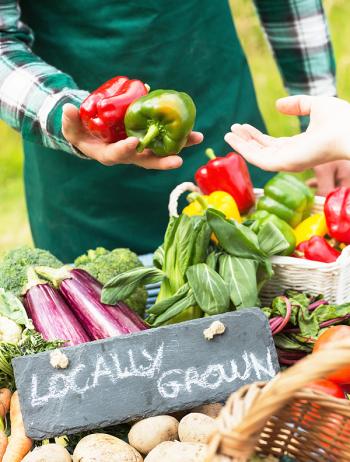
AgCenter nutritionist: Sustainable food is best
Is it sustainable?
It’s an increasingly important question to ask when it comes to agriculture and how we eat. In agriculture, the concept of sustainability is applied toward the production of food or other plant or animal products using farming techniques and practices that help to conserve natural resources and have minimal impact on the environment.
Sustainable agriculture enables us to produce healthful food without compromising future generations’ ability to do the same.
Why care about sustainability?
There are many benefits to moving toward more sustainable eating, said Diana Dyer, MS, RD, an organic farmer. According to Dyer, sustainable agriculture and eating practices:
—Improve the economic health and vitality of communities.
—Reduce the use of limited natural resources, such as fossil fuels.
—Protect the environment from chemicals, and practices that may harm farmer and consumer health.
—Preserve the diversity of plants, and animals and nutrients in soil.
—Encourage optimal nutrition through more naturally nutrient-dense foods.
Tips for Sustainable Eating
—Shop locally. Buy foods at local farmers markets. “Local farmers are committed to their communities,” said Dyer. “If you’re shopping at a farmers market, the farmers who are there are likely ‘neighbors.’ The money you spend at the market stays in your community.”
She explained the “local economic multiplier effect” — an often-referenced theory of the benefits a local economy receives when recirculating capital by sourcing locally. She gave the example, “If every family in Michigan spent $10 a week at a farmers market, it would keep $40 million dollars in the state, which would otherwise quickly move out of the state. Each dollar circulates three to seven times before it moves out.”
—Grow something. It could be herbs in a pot, tomatoes on a patio or a small plot in your yard. Growing your own food gives you a greater appreciation for what it takes to create food. It provides an understanding of the multitude of factors involved in making plants thrive, the attention needed to successfully grow food and how precarious the process can be. Those insights will likely influence how you buy, use and dispose of food.
—Initiate conversations about food. Talk with the farmers at the market, personnel at the grocery store and restaurateurs, or the growing number of people who are paying attention to how foods get on their plates. You can discover new tips, learn about new resources and find more local, sustainably-minded food producers and providers.
—Eat seasonally. Blueberries don’t grow in Montana during January, yet you can still buy “fresh” at this time. This means they’re likely coming from far, far away. When possible, focus on foods that are available in season where you live in an effort to support sustainability.
—Retool your grocery list. Think bulk foods, more minimally processed foods and more plant-based meals. Doing so translates into less packaging and waste, less energy used to produce certain foods and fewer artificial ingredients — those not found in nature — and chemicals in the food system.
—Vote with your wallet and your fork. There’s no better way to affect the direction of our food system and what grocers, restaurateurs and food companies produce and sell than to influence their bottom line. Ask food providers to support local farmers, local producers and sustainable agriculture. Show support through buying decisions.
Health doesn’t happen in the health care system nor does it happen by accident, said Kate Geagan, MS, RD. “It’s what you do in your kitchen and how you intentionally eat 365 days a year that does,” she said.
Dyer agrees, “Food is a connector in life and can add significantly to life’s satisfaction. There’s great pride in knowing that … you actively support sustainable agriculture and eat sustainably.”
Farmer’s markets in the area include:
—Most mornings at West Tunnel Boulevard and Naquin Street in Houma.
—Thursday afternoon at St. Francis Garden, Rienzi Drive, Thibodaux www.rienzi market.com.
—Saturday mornings at 314 St. Mary Street, Thibodaux www.downtownthibodaux.org/events/farmers-market.
—Saturday mornings at the Courthouse Square, downtown Houma.
—Saturday mornings at 4484 La. 1, Raceland.
—Bestlife Iberia Flash Market, 1505 South Hopkins St., New Iberia (fourth Thursday of each month, 4-6 p.m.)
—Creole Market, Hopkins Street Revitalization Association, 1200 Field St., New Iberia
For more information on this or any nutrition-related topic, contact Gautreaux, at the St. Mary Parish LSU AgCenter office, 600 Main St., Franklin or call 337-828-4100 ext. 170, or email bgautreaux@agcenter. lsu.edu.
Adapted from www.eat right.org.
- Log in to post comments
